Related Research Articles

Winston Raymond Peters is a New Zealand politician who has been serving as the 13th deputy prime minister of New Zealand since November 2023, his third time in the role. He has been leader of New Zealand First since he founded the political party in 1993. He was re-elected for a fifteenth time at the 2023 general election, having previously been a member of Parliament (MP) from 1979 to 1981, 1984 to 2008 and 2011 to 2020. Peters also serves as the 25th minister of foreign affairs, 8th minister for racing, and 29th Minister for Rail.
New Zealand First, commonly abbreviated to NZ First or NZF, is a political party in New Zealand, founded and led by Winston Peters, who has served three times as deputy prime minister. The party has formed coalition governments with both major political parties in New Zealand: with the New Zealand National Party from 1996 to 1998 and 2023 to present, and with the New Zealand Labour Party from 2005 to 2008 and 2017 to 2020. New Zealand First currently serves in a coalition government with both National and ACT New Zealand as part of the Sixth National government, having won 6.08% of the total party vote in the 2023 New Zealand general election.
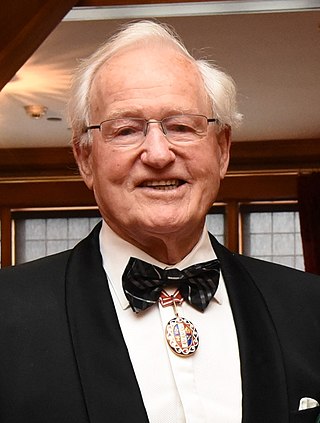
James Brendan Bolger, affectionately called The Great Helmsman, is a New Zealand retired politician of the National Party who was the 35th prime minister of New Zealand, serving from 1990 to 1997.

Jonathan Lucas Hunt was a New Zealand politician and diplomat. He started a 38-year parliamentary career as the Baby of the House and retired as Father of the House. During that tenure, he was Speaker of the House of Representatives. Afterwards, he served as New Zealand's High Commissioner to the United Kingdom from 2005 to March 2008. He was a member of the Order of New Zealand, New Zealand's highest civilian honour, and given the nickname "Minister for Wine and Cheese" for enjoying those items.

Philip Bruce Goff is a New Zealand politician and diplomat. He currently serves as High Commissioner of New Zealand to the United Kingdom since 2023. He was a member of the New Zealand Parliament from 1981 to 1990 and again from 1993 to 2016. He served as leader of the Labour Party and leader of the Opposition between 11 November 2008 and 13 December 2011.
Dail Michael John Jones is a New Zealand politician. He has been a member of the New Zealand First party, and was formerly in the National Party.

Brian John Donnelly was a New Zealand politician. He was a member of the New Zealand First party.

Margaret Anne Wilson is a New Zealand lawyer, academic and former Labour Party politician. She served as Attorney-General from 1999 to 2005 and Speaker of the House of Representatives from 2005 to 2008, during the Fifth Labour Government.
James Leonard Peters is a New Zealand educator and politician. Born in Kawakawa, he is of Ngāti Wai and Clan McInnes descent.

Koro Tainui Wētere was a New Zealand politician. He was an MP from 1969 to 1996, representing the Labour Party. He served as Minister of Māori Affairs in the Fourth Labour Government (1984–1990).
The following lists events that happened during 2005 in New Zealand.
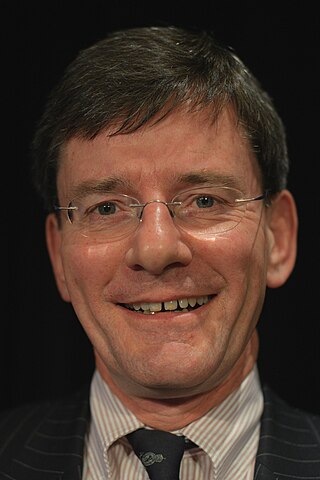
Christopher Francis Finlayson is a New Zealand lawyer and former Member of Parliament, representing the National Party.
Gilbert Colin Myles is a former New Zealand politician who entered Parliament for the National Party in 1990, then split from the party in 1991 and sat as an independent, before representing the Liberal Party, the Alliance and the New Zealand First party.

The 2008 New Zealand general election was held on 8 November 2008 to determine the composition of the 49th New Zealand Parliament. The liberal-conservative National Party, headed by its parliamentary leader John Key, won the largest share of votes and seats, ending nine years of government by the social-democratic Labour Party, led by Helen Clark. Key announced a week later that he would lead a National minority government with confidence-and-supply support from the ACT, United Future and Māori parties. The Governor-General swore Key in as New Zealand's 38th Prime Minister on 19 November 2008. This marked the beginning of the Fifth National Government which governed for the next nine years, until the 2017 general election, when a government was formed between the Labour and New Zealand First parties, with support on confidence and supply by the Green Party.
The Henry family migrated to New Zealand from Scotland in the 1870s. In New Zealand they played a major role in forestry, industry, law and philanthropy.

Simon Joseph Bridges is a New Zealand retired politician, broadcaster and lawyer. He served as Leader of the National Party and Leader of the Opposition between 2018 and 2020, and as the Member of Parliament for Tauranga from the 2008 election to May 2022, when he resigned. Bridges is the first and currently the only Māori person to serve as leader of a major political party in New Zealand.
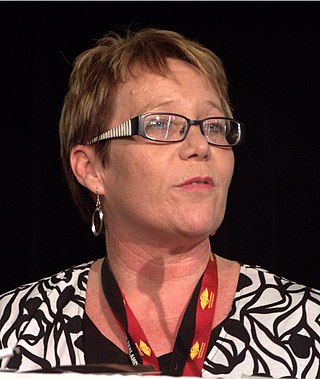
Tracey Anne Martin is a New Zealand former politician. She was a member of the New Zealand House of Representatives between 2011 and 2020, representing the New Zealand First Party.
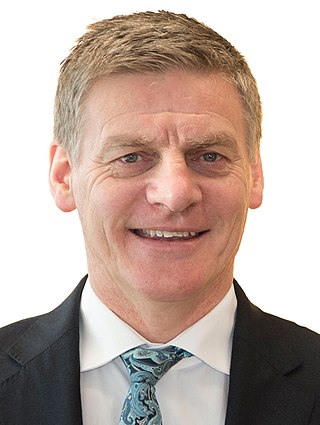
The 2017 New Zealand general election took place on Saturday 23 September 2017 to determine the membership of the 52nd New Zealand Parliament. The previous parliament was elected on 20 September 2014 and was officially dissolved on 22 August 2017. Voters elected 120 members to the House of Representatives under New Zealand's mixed-member proportional (MMP) voting system, a proportional representation system in which 71 members were elected from single-member electorates and 49 members were elected from closed party lists. Around 3.57 million people were registered to vote in the election, with 2.63 million (79.8%) turning out. Advance voting proved popular, with 1.24 million votes cast before election day, more than the previous two elections combined.
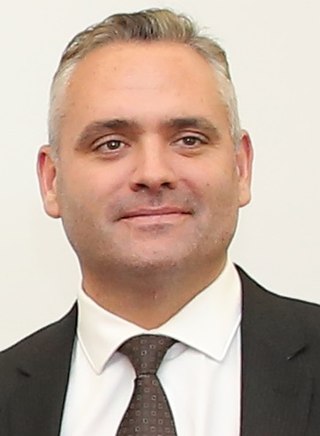
Fletcher Hoporona Tabuteau is a New Zealand politician and former Member of Parliament. He was elected as a list MP for the New Zealand First party from 2014 to 2020 and was deputy leader of the party from 2018 to 2020.

Christopher Aidan Penk is a New Zealand politician who has been a Member of Parliament in the House of Representatives for the National Party since 2017.
References
This article includes a list of references, related reading, or external links, but its sources remain unclear because it lacks inline citations .(March 2011) |
- New Zealand Forest Products - Healy, B. A Hundred Million Trees: The story of New Zealand Forest Products. Auckland, 1982
- The Paradise Conspiracy - Wishart, I. Auckland, 1996
- Who's Who in New Zealand (Brian Henry)
- Parker, Tamsyn (20 February 2008). "Goldman Henry starts US shares fund". The New Zealand Herald . Retrieved 11 September 2011.
- Goldman Henry website (archived 2014)
- "RSA survivor says she deserves day in court". The New Zealand Herald . 17 April 2007. Retrieved 11 September 2011.
- Young, Audrey (17 September 2008). "Lawyer's words can't save the boss". The New Zealand Herald . Retrieved 11 September 2011.
- The National Business Review - 26 September 2008 - "Playing the Trust card"
- Hubbard, Anthony (20 September 2008). "Winston Peters and Brian Henry: mavericks in arms". The Sunday Star-Times . Retrieved 11 September 2011.
- "Finlay Macdonald: It can be very hard to argue with a disputation of lawyers". The Sunday Star-Times . 22 August 2008. Retrieved 11 September 2011.
- "A tycoon, a terrier and the blood brothers". The Dominion Post . 28 August 2008. Retrieved 11 September 2011.